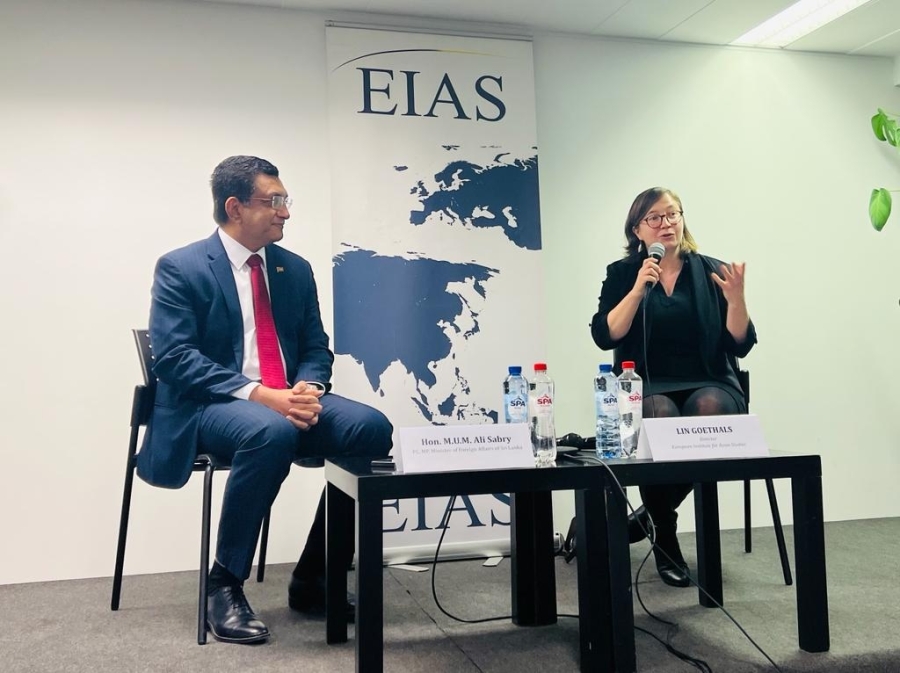The European Institute of Asian Studies (EIAS), in collaboration with the Embassy of Sri Lanka, hosted a thought-provoking seminar titled “EU-Sri Lanka Relations: Potential for Stronger Ties and New Economic Opportunities – A Vision for Sri Lanka.”
The event, which took place in Brussels on Tuesday, January 30th, brought together policymakers, diplomats, and experts to explore the evolving dynamics between Sri Lanka and the European Union.

Hon. M.U.M. Ali Sabry PC, MP, Minister of Foreign Affairs of Sri Lanka
Central to the seminar was an enlightening address by Hon. M.U.M. Ali Sabry PC, MP, Minister of Foreign Affairs of Sri Lanka.
Minister Sabry offered valuable insights into the future of EU-Sri Lanka relations, highlighting economic and political opportunities, as well as the potential challenges that lie ahead.
The discussion also delved into the external dimension of EU-Sri Lanka affairs within the broader context of the Indo-Pacific region, underscoring the significance of navigating shifting global geopolitical dynamics.
In his opening remarks, Minister Sabry expressed appreciation to the European Institute of Asian Studies for facilitating the dialogue and stressed the importance of considering Sri Lanka’s trajectory within the broader regional context.
Reflecting on Sri Lanka’s historical ties with Europe, Minister Sabry acknowledged the profound influence Europeans have had on Sri Lankan society, shaped by shared values and centuries of interaction.
The discussion touched upon various aspects of governance and economics, with Minister Sabry emphasising Sri Lanka’s commitment to democratic principles and the challenges posed by recent economic crises.
He outlined the progress made in addressing these challenges, citing achievements such as the stabilization of inflation, growth in tourism, and the restoration of foreign reserves.
Minister Sabry also highlighted Sri Lanka’s strategic position in Asia and its potential as a hub for regional cooperation and investment.
Top Priorities for Sri Lanka-EU Engagement:
- Strengthening Economic Ties: Minister Sabry underscored the importance of enhancing economic cooperation between Sri Lanka and the EU, particularly in key sectors such as renewable energy, information technology, and tourism. By fostering closer economic ties, both parties stand to benefit from increased trade and investment opportunities.
- Addressing Human Rights Concerns: Minister Sabry acknowledged the importance of addressing human rights concerns as part of Sri Lanka’s engagement with the EU. He emphasized the government’s commitment to upholding human rights standards and fostering dialogue to address any existing challenges.
- Promoting Regional Security: With Sri Lanka assuming the chairmanship of the Indian Ocean Rim Association (IORA), Minister Sabry highlighted the importance of promoting regional security and maritime cooperation. He stressed the need for collaborative efforts to address common security challenges and ensure stability in the region.
Challenges and Opportunities:
- Economic Recovery: While Sri Lanka has made progress in addressing economic challenges, including stabilizing inflation and restoring foreign reserves, significant challenges remain. Minister Sabry acknowledged the need for continued efforts to promote economic recovery, including addressing structural reforms and attracting foreign investment.
- Political Stability: With upcoming presidential elections on the horizon, Sri Lanka faces challenges related to political stability and governance. Minister Sabry emphasized the importance of managing internal divisions and fostering national unity to ensure a smooth transition of power and maintain stability.
- Geopolitical Dynamics: Minister Sabry highlighted Sri Lanka’s strategic significance in the broader Indo-Pacific region and its role as a key player in regional geopolitics. He emphasized the importance of navigating shifting global geopolitical dynamics and maintaining an independent foreign policy that promotes peace and stability in the region.
Upcoming Elections:
The seminar also addressed the upcoming presidential elections in Sri Lanka and their potential implications for the country’s future trajectory.
Minister Sabry acknowledged the significance of the elections and emphasised the importance of conducting them in a free, fair, and transparent manner.
He reiterated Sri Lanka’s commitment to democratic principles and expressed confidence in the country’s ability to navigate the electoral process effectively.
In conclusion, the EIAS Briefing Seminar provided a valuable platform for fostering greater understanding and cooperation between Sri Lanka and the European Union.
Minister Sabry’s insights shed light on the opportunities and challenges facing Sri Lanka and underscored the importance of constructive engagement and collaboration in shaping the future of EU-Sri Lanka relations.
As both parties continue to navigate complex economic and geopolitical landscapes, delegates agreed that events like the EIAS seminar serve as important catalysts for dialogue and partnership, paving the way for a future of shared prosperity and mutual benefit.
Click here for more on International Relations at EU Today
___________________________________________________________________________________________________

Follow EU Today on social media:
Twitter: @EU_today
@EU_sports
Facebook: https://www.facebook.com/EUtoday.net/
https://www.facebook.com/groups/968799359934046
YouTube: https://www.youtube.com/@eutoday1049












